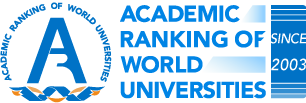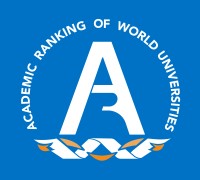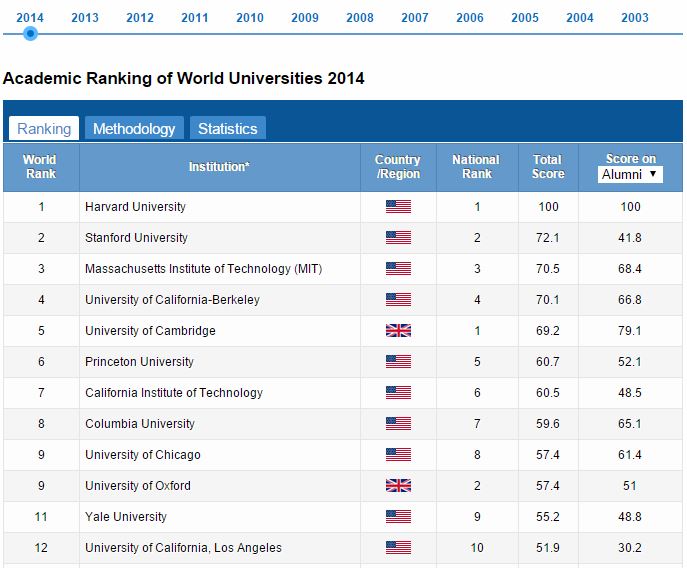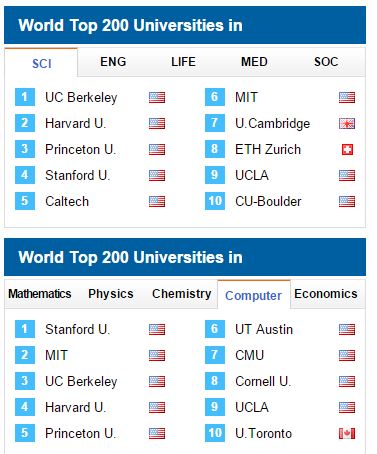카카오톡 상담 ID : Gcentre, Tel : 070 7010 3153, 이메일 : info@Gcentre.net
Academic Ranking of World Universities

세계 대학 학술 순위 (Academic Ranking of World
Universities, ARWU)는 중국 상하이
자오퉁 대학에서 출판한 발행물이다. 순위는 2003년부터
수행해왔으며 해마다 갱신되고 있다. 2009년부터는 Shanghai
Ranking Consultancy가 출판하고 있다. 이 순위는 동문의 노벨상과 필즈상 수상 (10%), 노벨상과 필즈상 수상 직원 (20%), 21개 과목 분류에서
자주 인용된 연구자 (20%), 네이처와 사이언스에
출판한 논문 (20%), 과학인용색인과 사회과학인용색인 (20%), 그리고 개인당 학업 성취도 (10%)를 기준으로
전 세계 1,200개의 고등 교육 기관을 비교하였다.
세계 대학 학술 순위는 QS 세계 대학 순위와 타임즈 고등 교육 세계 대학 순위와 나란히, 세 개의 가장
영향력 있고 널리 주시되는 국제 대학교 순위 가운데 하나로 여겨진다. The Chronicle of
Higher Education은 ARWU를 "가장
영향력 있는 국제 순위"라고 언급하였다.

About Us
The Academic Ranking of World Universities
(ARWU) is conducted by researchers at the Center for World-Class
Universities of Shanghai Jiao Tong University (CWCU). CWCU has been
focusing on the study of world-class universities for many years, published the
first Chinese-language book titled world-class universities and co-published
the first English book titled world-class universities with European Centre for
Higher Education of UNESCO. CWCU initiated the "First International
Conference on World-Class Universities" (WCU-1) in 2005 and organizes the
conference every second year, which attracts a large number of participants
from all major countries. CWCU endeavors to build databases of major research
universities in the world and clearinghouse of literature on world-class
universities, and provide consultation for governments and universities.
The Academic Ranking of World Universities
(ARWU) is published and copyrighted by ShanghaiRanking Consultancy.
ShanghaiRanking Consultancy is a fully independent organization on higher
education information and not legally subordinated to any universities or
government agencies. Any questions, comments or suggestions about ARWU should
be sent directly to ShanghaiRanking Consultancy at contact@shanghairanking.com.

About Academic Ranking of World Universities
The Academic Ranking of World Universities
(ARWU) was first published in June 2003 by the Center for World-Class
Universities (CWCU), Graduate School of Education (formerly the Institute of
Higher Education) of Shanghai Jiao Tong University, China, and updated on an
annual basis. ARWU uses six objective indicators to rank world universities,
including the number of alumni and staff winning Nobel Prizes and Fields
Medals, number of highly cited researchers selected by Thomson Reuters, number
of articles published in journals of Nature and Science, number of articles
indexed in Science Citation Index - Expanded and Social Sciences Citation
Index, and per capita performance of a university. More than 1200 universities
are actually ranked by ARWU every year and the best 500 are published.
Although the initial purpose of ARWU was to
find the global standing of top Chinese universities, it has attracted a great
deal of attention from universities, governments and public media worldwide.
ARWU has been reported by mainstream media in almost all major countries.
Hundreds of universities cited the ranking results in their campus news, annual
reports or promotional brochures. A survey on higher education published by The
Economist in 2005 commented ARWU as "the most widely used annual ranking
of the world's research universities". Burton Bollag, a reporter at
Chronicle of Higher Education wrote that ARWU "is considered the most
influential international ranking".
One of the factors for the significant
influence of ARWU is that its methodology is scientifically sound, stable and
transparent. The EU Research Headlines reported ARWU work on 31st December
2003: "The universities were carefully evaluated using several indicators
of research performance." Chancellor of Oxford University, Chris Patten,
said "it looks like a pretty good stab at a fair comparison."
Professor Simon Margison of Institute of Education, University of London
commented that one of the strengths of "the academically rigorous and
globally inclusive Jiao Tong approach" is "constantly tuning its
rankings and invites open collaboration in that".

ARWU and its content have been widely cited
and employed as a starting point for identifying national strengths and
weaknesses as well as facilitating reform and setting new initiatives. Bill
Destler, the President of the Rochester Institute of Technology, drew reference
to ARWU to analyze the comparative advantages that the Western Europe and US
have in terms of intellectual talent and creativity in his publication in the journal
Nature. Martin Enserink referred to ARWU and argued in his paper published in
Science that "France's poor showing in the Shanghai ranking ... helped
trigger a national debate about higher education that resulted in a new law...
giving universities more freedom.
In order to better meet the diversified
needs for the global comparison of universities, besides ARWU, CWCU developed
the Academic Ranking of World Universities by Broad Subject Fields (ARWU-FIELD)
in 2007 and Academic Ranking of World Universities by Subject Fields
(ARWU-SUBJECT) in 2009. ARWU-FIELD provides the world’s top 200 universities in
five broad subject fields, including Natural Sciences and Mathematics,
Engineering/Technology and Computer Sciences, Life and Agriculture Sciences,
Clinical Medicine and Pharmacy, and Social Sciences. ARWU-SUBJECT publishes the
world’s top 200 universities in five ranked subjects, including Mathematics,
Physics, Chemistry, Computer Science and Economics/Business.
Since 2009 the Academic Ranking of World Universities
(ARWU) has been published and copyrighted by ShanghaiRanking Consultancy.
ShanghaiRanking Consultancy is a fully independent organization on higher
education information and not legally subordinated to any universities or
government agencies.